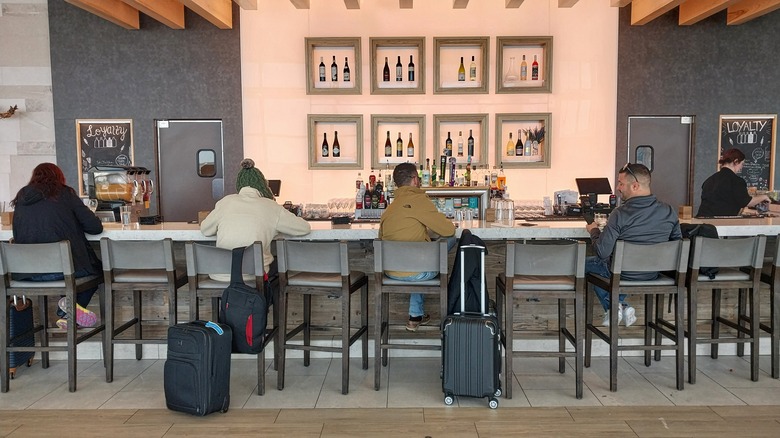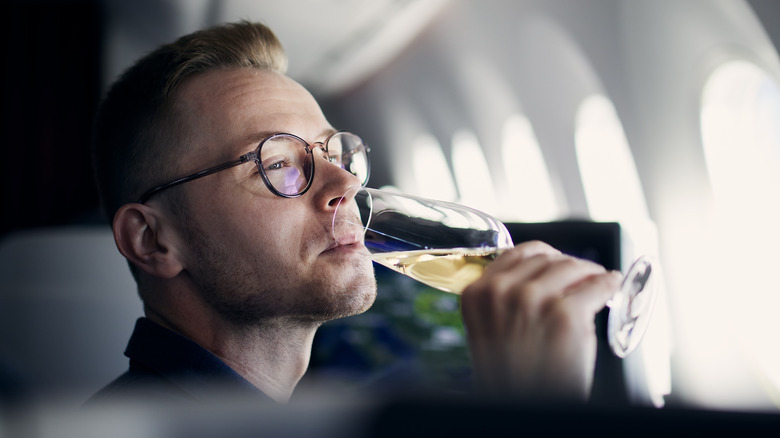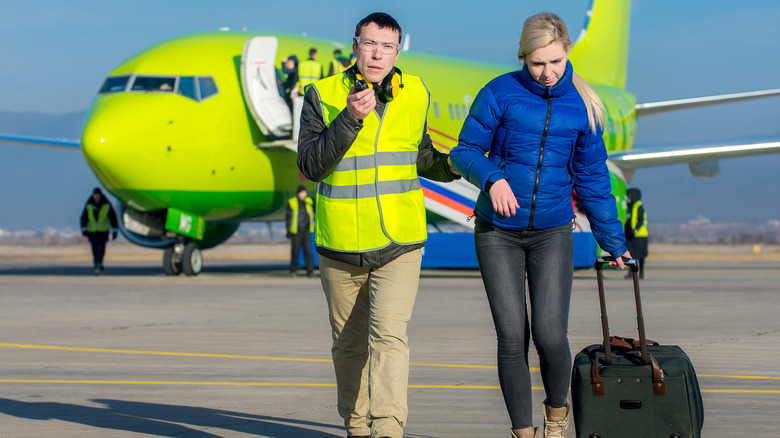Think Twice Before Drinking Prior To Getting On A Plane. Here's Why
Most travelers know that airports seem to operate in their own bubble where normal social rules don't apply. And, once inside, having a beer with breakfast or enjoying a cocktail before noon feel perfectly acceptable while waiting for your flight. Because whether it's a pre-holiday celebration with your friends, a way to pass the time during delays or layovers, or an attempt to combat your airport anxiety and pre-flight nerves, sipping on a boozy beverage is a standard part of the airport experience.
However, airport bars aren't a free-for-all, and getting too carried away with the drinks before boarding can lead to some pretty serious consequences once you're at the gate. After all, according to most airlines' contracts of carriage — the legal agreement you accept when purchasing your ticket — passengers who appear to be too intoxicated or under the influence can be denied boarding or get removed from the aircraft. This applies to all forms of intoxication: Whether from alcohol, marijuana (even in places where it's legal), or other substances.
Even the Federal Aviation Administration maintains strict regulations about alcohol and flying, which stipulate that airlines can only serve alcohol to passengers who don't appear intoxicated, must deny boarding to visibly drunk travelers, and cannot allow passengers to drink their own alcohol on board (even the TSA-approved mini bottles you might have purchased duty free). In a post published on Medium, the FAA warned that getting too drunk before boarding might result in getting denied entry, and emphasized that threatening or assaulting crew members while intoxicated can result in fines of up to $35,000 or jail time.
Getting too drunk will get you barred from flying
In terms of passenger safety, federal aviation regulations give airlines and their staff clear authority to prevent intoxicated passengers from boarding. And this isn't just a guideline or "recommendation" — it's a strict requirement that all airlines must follow to maintain their and other passengers' safety.
Unfortunately, drunk travelers are actually the most frustrating passengers flight attendants have to deal with. Not only are they usually loud and disruptive, but they generally become increasingly difficult to manage during the flight. In March 2024, for example, a United Airlines flight from London to New York was forced to make an emergency landing in Maine after an allegedly intoxicated passenger had to be physically restrained with cable ties after threatening the crew. And that's not the first time a similar situation has happened: From Spain to China, there are countless stories of intoxicated passengers wreaking havoc on their flight.
As for passenger screening, gate agents and flight attendants receive specific training that teaches them to effectively identify signs of intoxication. This ultimately helps them distinguish between passengers who might be experiencing other conditions versus those who have simply had a little too much to drink.
What happens when drunk passengers aren't allowed to board?
The consequences of being denied boarding due to intoxication go far beyond just missing your flight. For starters, airlines aren't required to rebook passengers who were denied boarding for being drunk — which means you could lose the entire value of your ticket.
Beyond that, most travel insurance companies won't cover any alcohol-related incidents, which means you likely won't receive any compensation from losses on accommodation or other bookings either. And if you do manage to board but cause problems during the flight, the penalties are even more severe, from getting slapped with federal criminal charges to substantial fines from the FAA.
Lastly, just because you've paid premium prices for a private flight doesn't mean you're exempt from following the rules. Truth is, these guidelines apply equally whether you're flying commercial or via private charter — and pilots and crew members must still follow the same federal regulations about dealing with intoxicated passengers.


